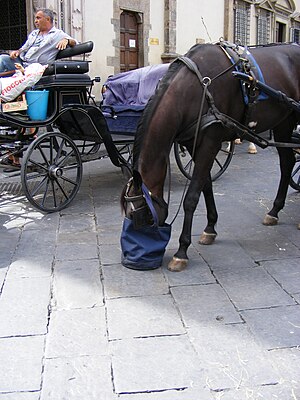χιλωτήρ: Difference between revisions
ὃν οὐ τύπτει λόγος οὐδὲ ῥάβδος → if words don't get through, neither a beating will | if the carrot doesn't work, the stick will not work either | whom words do not strike, neither does the rod
mNo edit summary |
mNo edit summary |
||
| Line 17: | Line 17: | ||
}} | }} | ||
==Wikipedia EN== | ==Wikipedia EN== | ||
[[File:Pferde-Fresssack.jpg|thumb|A horse eating from a [[feedbag]] in Florence, Italy]] | |||
A feedbag, feed bag, feeding bag, nosebag, or morral, is a bag, filled with fodder, and attached to the head of a horse, enabling it to eat. The main advantages are that only a small amount of the feed is wasted, and it prevents one animal consuming the ration of another. | A feedbag, feed bag, feeding bag, nosebag, or morral, is a bag, filled with fodder, and attached to the head of a horse, enabling it to eat. The main advantages are that only a small amount of the feed is wasted, and it prevents one animal consuming the ration of another. | ||
Revision as of 13:42, 15 April 2021
English (LSJ)
ῆρος, ὁ,
A nose-bag, nose bag, nosebag, feedbag, feed bag, feeding bag, morral, nosebag for cattle, nosebag for horses, feedbag, feed bag, feeding bag, morral, UPZ76.3 (ii B. C.), PLond.2.402.24 (ii B. C.), Poll.1.185, Hsch.
German (Pape)
[Seite 1356] ῆρος, ὁ, der Futtersack, der dem Vieh über den Kopf gehängt wird, Hesych.; aber unter φορβειά steht χειλωτήρ.
Greek (Liddell-Scott)
χῑλωτήρ: ῆρος, ὁ, πήρα ἀπὸ τοῦ λαιμοῦ τοῦ κτήνους ἐξηρτημένη καὶ περιέχουσα τὴν τροφὴν αὐτοῦ, τουρκ. «τουρβᾶς», «τὸ τοῖς ὑποζυγίοις ἀπὸ κορυφῆς ἐξαρτῶμενον, ἐν ᾧ ἡ τροφὴ» Ἡσύχ.
Wikipedia EN

A feedbag, feed bag, feeding bag, nosebag, or morral, is a bag, filled with fodder, and attached to the head of a horse, enabling it to eat. The main advantages are that only a small amount of the feed is wasted, and it prevents one animal consuming the ration of another.
It can be made of leather, reeds, but more commonly is a thick fabric or light canvas. Some modern designs are made of Cordura or other durable nylon, with a solid bottom and mesh sides for ventilation.
To access the portion of the feed near the bottom of the bag, the horse needs to be able to touch its head to the ground, allowing it to push its nose into the end of the bag.
In popular US culture, the feedbag is used in the expression "strap on the old feedbag", meaning to "dine". It suggests that the diner will pay little attention to etiquette, and will dine heartily. The term is also found in numerous restaurant names.
Translations
Bulgarian: торба за зоб; Catalan: morral; French: musette; German: Futtersack; Ancient Greek: χιλωτήρ; Irish: socmhála, mála cinn
